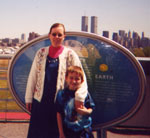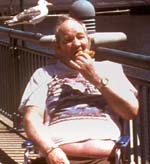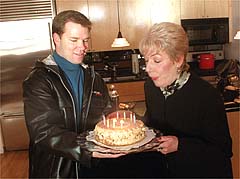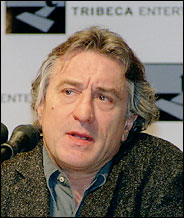Reliving 9/11: Too Much? Too
Soon?
By JULIE SALAMON
One week after they've each lost a parent in the World Trade
Center attack, two boys, ages 7 and 16, conduct an experiment.
They take a map of the world into a local store in Tottenville,
at the southern tip of Staten Island. As customers come in,
the older boy hands them a marker and asks them to circle Afghanistan.
A college student marks France, a high school teacher Israel,
a third customer Poland.
The boy asks them to name the leader of the terrorist organization
that attacked America. The name Bin Laden draws blanks.
 This
scene comes from "Telling Nicholas," an HBO documentary,
showing tonight, that follows the family of Michele Lanza, one
of the victims, in the days after the attack. Her 7-year-old
son, Nicholas, is one of the boys in the store; he still believes
his mother is missing, not dead. This
scene comes from "Telling Nicholas," an HBO documentary,
showing tonight, that follows the family of Michele Lanza, one
of the victims, in the days after the attack. Her 7-year-old
son, Nicholas, is one of the boys in the store; he still believes
his mother is missing, not dead.
While the documentary focuses on a family's loss, the boys'
experiment is a reminder of how dramatically our view of the
world has changed since that day. Not nearly as many people
in this country would mistake Poland for Afghanistan now, nor
would they be at a loss to name Osama bin Laden as the terrorist
leader. Much of that instant education came from television,
which in the early days provided both news and comfort. Then
followed explication, in an onslaught of documentaries. The
broadcast networks and cable channels have covered the rise
of terrorism, the roots of Islam, the sociology of Afghanistan,
the structural history of the World Trade Center and even the
fate of pets living at ground zero (an Animal Planet production).
Six months after the attack, the commemoration began with those
unnerving beams of light sprouting from the World Trade Center
site. On television, CBS presented "9/11," its horrifying vision
of the chaos inside the towers that day. HBO is weighing in
tonight with "Telling Nicholas"... It all seems very fast...
In our speeded-up culture, we want instant catharsis. The phenomenon
is most pronounced in television, in part because the World
Trade Center was situated in the country's media epicenter.
Even if it hadn't been, cameras are everywhere. In many documentaries,
including "Telling Nicholas," the cameras record other people
recording the event. We may want to look away, but a great many
people feel compelled to watch. CBS's "9/11" drew a huge audience,
some 52.4 million people... Before Sept. 11, HBO's America Undercover
series was planning to show a documentary called "Animal Passions,"
about sexual relations between animals and humans. "Telling
Nicholas" took that slot. Many more documentaries on the attack
and related subjects are in production, most for the one-year
anniversary. The major networks are planning marathon events.
Together with the cable news channel coverage, the intensity
will probably be unprecedented in the medium - bigger than the
Super Bowl, Olympics, J.F.K.'s assassination, Princess Diana's
death.
 Others are rolling out earlier. Some, like "Telling Nicholas,"
were begun as soon as the planes hit the World Trade Center.
James Ronald Whitney, a filmmaker and stockbroker who lived
just a few blocks away, went to the roof of his building and
kept a steady camera on the horror as it happened.
Others are rolling out earlier. Some, like "Telling Nicholas,"
were begun as soon as the planes hit the World Trade Center.
James Ronald Whitney, a filmmaker and stockbroker who lived
just a few blocks away, went to the roof of his building and
kept a steady camera on the horror as it happened.
The next day he saw Michele Lanza's face on a poster, one of
the thousands placed by desperate families. He called her family
to offer help, and ended up recording the most intimate aspects
of their shock and grief, including some nasty family infighting
and emotional breakdowns.
It is an astonishing film in many
ways, with its intimate portrayal of a family coming to grips
with unfathomable events, followed by a determined hopefulness
that Michele might still be alive and then despair. Yet the
filmmaker's presence also seems inappropriate, and the viewer
becomes complicit. What do we gain by watching and listening
as Nicholas's father tells him, 10 days after the attack,
that his Mommy has died? The camera is kept at a remove, but
a microphone is near. Advertisement
The unsettling voyeurism becomes especially weird when Mr.
Whitney brings in Dr. Gilda Carle, an author and television
therapist, to help counsel the Lanzas. They bond with her
because they've seen her on television and don't seem to mind
that she shows up buffed and made up for the camera.
Bizarre as all this may seem, the film provides a blunt reality
that's missing from so many burnished visions of victims and
rescuers. Though CBS's gruesome "9/11" was cast as a tribute
to the firefighters, it often felt like a tribute to the filmmakers
(the admittedly adorable Naudet brothers) simply for being
there. It unwittingly showed something authentic but far from
reassuring - that the firefighters were merely humans, unprepared
for this historic disaster. "Telling Nicholas" accepts
fallibility as a given. The Lanza family has its strengths,
but they react to this terrible stress with anger, hostility
and eccentric behavior. All these reactions seem understandable.
What's strange is the family's willingness to reveal all this
- at least that's how it seems now, removed from those first
days of incomprehension and desperation, when families of
victims looked for hope anywhere, even to a stranger with
a camera.
That's HBO's style, to personalize and to provoke...Will this
outpouring help alleviate anxiety about the attacks and their
future consequences or make it worse?
"It will throw some people back, it will help some people
cope," said Lawrence Aber, a professor of psychology and public
health at Columbia University's Mailman School of Public Health.
Professor Aber worked with the New York City Board of Education
on a recently released study about the effects of the attacks
on children, and he thinks that documentaries can help them
and their parents put the attacks into a larger context. It's
useful, he said, to learn about other cultures and what they
think of the United States, and about the conditions in which
other people live.
But, he added, programs like CBS's "9/11," which drop people
into undigested dread and panic, could be too disturbing for
many people. "If all the documentary diet was of that nature,
it would increase anxiety," Professor Aber said. "A little
bit of fear and anxiety is intelligent in a dangerous world.
But an overwhelming amount of fear and anxiety is debilitating.
If you watch a lot of these documentaries, you'll be fried.
I do believe that most viewers are going to be able to vote
with the clicker. But I am concerned about more vulnerable
people and children who may have a reduced ability to click
away."
As we continue to be reminded, who isn't feeling more vulnerable
these days?
New York Times
April 15, 2001
[COVER STORY]
Faith, Hope and Clarity: 'America Undercover Sundays,' on
HBO
Want pathos, pain and courage? Get real. No scripts. No casting.
No rehearsals. Nobody wins a million dollars or is expelled
from the outback. Nobody is exposed to Club Med promiscuity
or boot camp brutality. And anybody who doesn't survive, well,
that means they're dead and documented.
 ...This is reality television, slice of life stuff, done HBO
style. But voyeurs beware: "America Undercover Sundays," the
11th installment documentary series recently given the not-so-dubious
distinction of becoming the tough act that follows "The Sopranos,"
is not for lightweights...That incestuous grandpa named Melvin
Just--his grandson, James Ronald Whitney, is the too-close-for-comfort
filmmaker here--really does molest his offspring here ("Just,
Melvin: Just Evil," next Sunday).
...This is reality television, slice of life stuff, done HBO
style. But voyeurs beware: "America Undercover Sundays," the
11th installment documentary series recently given the not-so-dubious
distinction of becoming the tough act that follows "The Sopranos,"
is not for lightweights...That incestuous grandpa named Melvin
Just--his grandson, James Ronald Whitney, is the too-close-for-comfort
filmmaker here--really does molest his offspring here ("Just,
Melvin: Just Evil," next Sunday).
.No reality is too tame--or tawdry--for the series. If it
happens, it's eligible...Placing "America Undercover" after
"The Sopranos," HBO's most watched series, with an average
of 10 million viewers last season, is no coincidence: "This
is not a one-time experiment," (Chrism Albrecht, president
for HBO original programming) said...
-- By Robin Finn
New York Times
May 4, 2001
Safe on the Outside
(Or So You Think)...part of (HBO's) "America Undrcover" series,
recently given prominence with a 10 p.m. Sunday time slot,
following HBO's jewel, "The Sopranos"...the "Undercover" series
isn't a muckraking operation--at least not in the classical
sense. These documentaries aim to expose unusual and often
unpleasant (and sometimes odious) corners of American life,
but not to reform them. Their subjects have included sexual
abuse of children ("Just, Melvin: Just Evil"), Internet
hatemongers, faith healers ("Miracles"), prostitutes and now,
mental illness ("Bellevue: Inside/Out").
Are these documentaries (at least some of them) simply television's
version of the old Coney Island freak shows? They are unnerving
because we are invited to peep without being proselytized.
This unvarnished voyeurism doesn't try to legitimize our prurience
with a call to action. They seem to say: peeping itself can
be a valuable exercise. Much of the human condition is vile
(or difficult or weird). Why pretend otherwise...Putting a
lens in the face of evil is an important form of indecent
exposure (...making us co-dependents as well as voyeurs.)
HBO tries to offset the rawness by occassionally...providing
links on the Internet to organizations dedicated to the issues
certain documentaries examine. When the cable network showed
"Just, Melvin: Just Evil," [director, James Ronald
Whitney's] exploration of his own family's rampant child molestation,
the toll-free number for an abuse hotline was posted onscreen
after the documentary. For its suicide documentary, HBO joined
with the National Alliance for the Mentally Ill to distribute
information about suicide.
The desire to look at the forbidden is acceptable, even welcome,
in fiction. Explaining the appeal of "One Flew Over the Cuckoo's
Nest," the film critic Pauline Kael wrote, in 1975: "We all
fear being locked up among the insane, helpless to prove our
sanity, perhaps being driven mad; this fear is almost as basic
as that of being buried alive. And we can't formulate a clear-cut
difference between sane and insane."...
-- By Julie Salamon
New York Times
April 30, 2000
A Broker's Painfully Personal Trail
NEW YORK -- On Wall Street, intimate self-disclosure usually
involves the size of your co-op apartment, the price of your
car or the perils of your $20,000 trek through the Andes.
But for James Ronald Whitney, 36 and a star broker at Tucker
Anthony, it involves telling how his maternal grandfather
sexually abused Whitney's mother, uncle, aunts and step-aunts,
some from the age of 2, they said. And telling not just his
friends and business associates, but also the world, through
a feature-length documentary film, "Just, Melvin,"
shown at the Sundance Film Festival in January, praised
by Roger Ebert as "one of the best docs of the year" and recently
sold to HBO, which plans to show it in 2001.
 "The
film is about a courageous family, my family, who has a powerful
and chilling story to tell about the abuse they suffered because
of my grandfather," Whitney -- Ron to friends -- said in a
conversation at his 3,000-square-foot downtown Manhattan loft. "The
film is about a courageous family, my family, who has a powerful
and chilling story to tell about the abuse they suffered because
of my grandfather," Whitney -- Ron to friends -- said in a
conversation at his 3,000-square-foot downtown Manhattan loft.
"I want it to serve as a wake-up call to society and as a
warning to those monsters like my grandfather who are still
out there."
So far, no one -- neither clients nor colleagues -- has been
put off by a film whose tone is so contrary to a universe-mastering
culture.
"I was shocked that he opened himself up to the straight-backed
guys on Wall Street," said Jeanne Moos, a CNN correspondent
and a client of Whitney. "But the film actually convinced
me to invest with him. You have to invest with someone, and
when I saw the film, I was impressed with that."
Executives like Rakesh Khilnani, a Tucker Anthony senior vice
president who has worked with Whitney since 1994, were sympathetic.
"It's serious stuff that was happening in his family," Khilnani
said. "We don't take it lightly. But it's important that it
be spoken about."
The idea for the film began brewing three years ago as Whitney's
maternal grandmother lay on her deathbed. He decided that
it was time to explore a forbidding topic: how his grandfather,
Melvin Just, a mechanic from Carlotta, Calif., traumatized
his family. Whitney wanted some answers.
"He molested my family, including my mother, and made her
suicidal," Whitney said, adding that his parents had split
when he was nine years old. In some of the movie's most emotional
scenes, Whitney confronts his grandfather, who died at 71,
shortly after filming was completed. Just denies all the accusations.
In 1979, he was convicted of 12 counts of child molestation
in his family and sentenced to 13 years in prison. He served
less than nine years in a state prison in San Luis Obispo,
Calif.
On camera, aunts of Whitney discuss drug and alcohol problems
as well as being molested. Three of them also say they witnessed
Just rape and murder a social worker who was assigned to protect
the children from him. Although Just was a suspect in the
killing, he was never charged in the case, which remains unsolved.
"It's possibly too honest for some people," Whitney said of
the film. "But I think society is ready for some honesty."
Whitney, who is divorced, worked on his film during free time
and on vacations, traveling around the country to interview
relatives, many of whom he had not seen in years. The film
won the best documentary feature award at the Santa Barbara
International Film Festival and Newport Beach Film Festival.
Still, he always kept a finger on the stock market. At the
Sundance festival in January, he had a cell phone in his hand
as he conducted interviews.
"CNBC was my alarm clock," he said. "In the mornings, I equally
grabbed the entertainment and business sections of all the
newspapers. I knew when Coke was getting rid of 1,200 employees."
With no previous filmmaking experience, Whitney, who grew
up in Las Vegas and studied economics at Arizona State University,
invested nearly $500,000 of his own money to produce "Just,
Melvin," which he also wrote and directed. HBO agreed
to pay what a spokeswoman said was "six figures" for the film.
"Between the monetary Awards from festivals and the
HBO deal, the film is in the black," Whitney said, although
he declined to give specifics.
Whitney was already used to being before the public. As a
dancer, he was a contestant on the "Dance Fever" and "Star
Search" television shows in the mid-1980s. In the film, he
is seen competing on television game shows and performing
with the Chippendales dancers.
Even while performing as a dancer, Whitney ran a frozen yogurt
and ice cream shop in Los Angeles, among other small businesses,
and gave investment advice to friends. He passed his brokerage
license exam in the early 1990s. After working for a smaller
firm, in 1995 he joined Tucker Anthony, the banking and brokerage
firm that was formerly part of John Hancock Mutual Life Insurance.
"My mom raised me to be an overachiever," he said, a Cheshire
cat grin spreading across his decidedly clean-cut, innocent
features.
Given his critical success, he is already at work on another
film, about a friend who is involved in the cybersex industry.
But he is keeping his day job, which he says thrills him.
"I get so excited by empirical data," Whitney said. "That's
why I'm a stockbroker. I like to solve puzzles. Market hours
are play time for me. It's like one big game show that begins
at 9:30 a.m. It's like the final round of 'The $25,000 Pyramid,'
because it's so time-sensitive. During market hours, as 4
O'clock approaches, I get sad."
Besides, he can put the money to a good use. "My financial
success on Wall Street," he said, "has allowed me to afford
my creative outlets."
-- Abby Ellin
The New York Times Magazine
Sunday, March 3, 2002
GOOD DRAMA TRUMPS GOOD TASTE FOR SHEILA NEVINS.
It's a formula that has made her the player of the documentary
film world...Honors have been plentiful: HBO documentaries
have received 10 Oscars, 43 Emmys, 17 George Foster Peabodys.
When the Academy Award nominations were announced last month,
HBO productions received four of the five nominations for
Best Documentary Feature...Last year, Chris Albrecht, HBO's
president for original programming, gave her productions a
boost...giving them the prime 10 p.m. spot following "The
Sopranos." Ratings in that time period rose 15 percent from
the previous year...
Even when the topic is familiar--AIDS, disability, murder,
hate groups, incest, addiction, Monica Lewinsky--the style
is distinctive. A Sheila Nevin's production takes its viewers
inside frightening, painful and weird corners of human existence.
In last year's "Just, Melvin: Just Evil," child abuse
was explored through (James Ronald Whitney's) investigation
of his own family's rampant molestation...As for Nevins, this
spring it's business as usual--except that it isn't. "Animal
Passions" has been replaced with (Whitney's) "Telling Nicholas,"
about a family dealing with a son whose mother was killed
in the World Trade Center attack. HBO has also added a show
in which Giuliani reconstructs that day...Earlier, Nevins
had rejected the idea of a Giuliani piece, but after meeting
him in October and listening to him tell about what happened
on Sept. 11, she was mesmerized.."I'd never heard the story
that way before," she says. For Nevins, that's as good a reason
as any.
-- by Julie Salamon
New York Times
Wednesday, March 21, 2001
Seamy or Serious, It's Now Center Stage
In the late 1970's, when HBO was still a newfangled television
network, it hastily put together a documentary unit as part
of an effort to expand its programming hours from 8 to 24.
Under the direction of Sheila Nevins, a young producer out
of network news, the unit went on to develop its own brand
of nonfiction television that was unencumbered by the sensitivities
of sponsors and regulators. Ms. Nevin's main mission was to
acquire or produce programs that would create enough water
cooler buzz that people who did not have HBO would feel that
they had to subscribe to it or face pop-culture illiteracy.
The result: a brash and gritty style of documentary that at
times has ventured toward soft-core pornography by taking
viewers inside topless bars, brothels and the bedrooms of
everyday couples but has also won Academy, Peabody and Emmy
Awards for films on such topics as war crimes and youth violence.
Those documentaries, most under the "America Undercover" title,
have now taken center stage at HBO. On March 11 they were
given one of television's most coveted weekly time slots,
Sundays at 10 p.m., after HBO's most watched program, "The
Sopranos."
...April 22 "America Undercover" will feature "Just, Melvin:
Just Evil," in which the filmmaker James Ronald Whitney "takes
a hard look at the sexual abuse that was perpetrated in his
own family by his grandfather, Melvin Just. He speaks to Melvin's
children and step-children, almost all of whom were molested
as children, and looks at the devastating legacy of sexual
abuse."
...I'm Chekovian," (Ms. Nevins) said..."I believe it's dark
and rainy outside almost all the time and that sex is a big
laugh and we're too serious about what's fun and we're not
honest enough about what's sad."
-- Jim Rutenberg
TriBeCa Festival Celebrates Film and Resilience
by Robin Pogrebin, May 7, 2002
 Certainly
the world doesn't need another film festival. But the people
behind the TriBeCa Film Festival felt strongly that New York
needed this one. Certainly
the world doesn't need another film festival. But the people
behind the TriBeCa Film Festival felt strongly that New York
needed this one.
So when you ask Robert De Niro and Jane Rosenthal, founders
of TriBeCa Productions, how their film festival, which opens
tomorrow and runs through Sunday, will differ from Sundance
or Cannes or Toronto, they say they do not really know yet.
"As it goes on, hopefully it will define itself," Mr. De Niro
said.
Soon it becomes clear that the importance of this first festival
lies not so much in the films featured - more than 150 of
them, from shorts like the 14-minute Spanish film "Bamboleho"
to major Hollywood premieres like "Star Wars: Episode II -
Attack of the Clones" - as in its location.
Because of Mr. De Niro's name and the prestige of TriBeCa
Productions, founded in 1988, doors appear to have opened
easily. American Express swooped in as the festival's presenting
sponsor. Kevin Spacey, Helen Hunt and Isaac Mizrahi agreed
to be judges for the film competition. Sidney Lumet, Susan
Sarandon and Alan Alda agreed to participate in panels on
topics like "Producing 101" and "Making Science More Sexy."
In addition to "Star Wars," Hollywood is sending several splashy
premieres, including "Insomnia," with Al Pacino, Robin Williams
and Hilary Swank; "About a Boy," with Hugh Grant and Toni
Collette; and "Divine Secrets of the Ya-Ya Sisterhood," with
Sandra Bullock, Ellen Burstyn and Ashley Judd.
Martin Scorsese is curator for a series of newly restored
film classics, beginning with "Viva Zapata," and collected
his favorite films about New York. The festival has benefited
from a hip advertising campaign featuring Billy Crystal, Gwyneth
Paltrow, Danny DeVito and others.
Except for films entered in the competition, however, there
was no submission process; the festival's films were chosen
only by invitation, said David Kwok, the festival's filmmaker
coordinator. And even some of the low-budget ones come with
the imprimatur of previous recognition. The festival received
more than 1,300 entries, and the winners will be announced
at the conclusion of the festival..
The festival will also feature a series of films that grew
directly out of Sept. 11, including "Telling Nicholas,"
a film by James Ronald Whitney about a 7-year-old boy whose
father waited 10 days before telling him that his mother had
died in the fallen towers, and "From the Ashes ã 10 Artists"
by Deborah Shaffer, which profiles 10 artists as they related
their experiences of Sept. 11.
The festival's organizers said their location on Greenwich
Avenue between Franklin and North Moore Streets, so close
to ground zero, was a constant reminder about the larger purpose
of their efforts. "All you have to do is walk out of the building
and look left," Ms. Rosenthal said.
|

